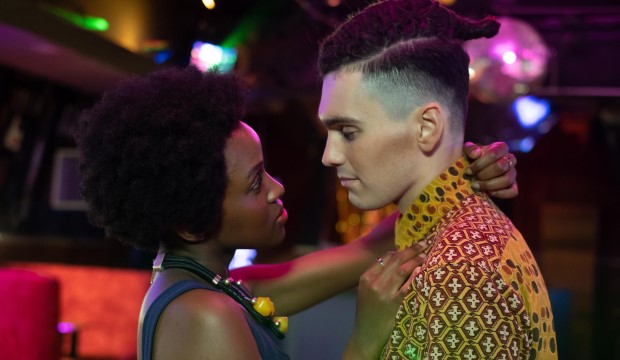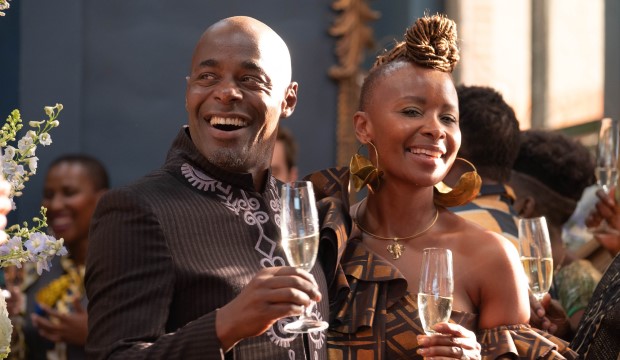Noughts and Crosses, BBC One review ★★★★★
Based on the evocative novels by Malorie Blackman, Noughts and Crosses takes place in an alternate Britain where white people ('noughts') are subordinate to people of colour ('Crosses')
Masali Baduza and Jack Rowan in Noughts and Crosses, BBC One
A
great way of showing a problem is by constructing its antithesis. YA author Malorie
Blackman does just this in her novel series Noughts
+ Crosses, building an alternate Britain (here named Albion) strangled
by societal racism. Blackman presents a world that runs contrary to history, with white people (‘noughts’) being subordinate to a black ruling class (‘Crosses’).
The BBC’s high-budget series adaptation really digs into the heart of Blackman’s message. In reversing the prejudice, we’re better able to imagine, see, and comprehend the extent of racism in the real world. More than that, the series acts like a poetic, political deconstruction of what racial privilege means.

Sephy (Masali Baduza) and Callum (Jack Rowan) engage in a forbidden romance
In this world, history has been swapped around. 700 years prior, the continent of Aprica (not a typo) colonised the countries of Europe – making people of colour the dominant race. In a different-looking London, the Crosses live in large, opulent houses and noughts reside in tight living spaces. Crosses can afford to go to university; noughts can’t. Crosses make up the entire political cabinet; noughts are barely seen in senior positions, usually working as cleaners, waiters, or construction workers. And although slavery has been abolished, the noughts are still servile to their Cross masters.
Screenwriter Lydia Adetunji harshly captures this contrast in the very different lives of Callum (Jack Rowan), a nought waiter, and Sephy (Masali Baduza), a Cross undergraduate. They eventually engage in a predictable romance, effectively forbidden in Albion, and their relationship naturally assuages their in-built prejudices.
Although there’s a lack of simmering chemistry between Rowan and Baduza, they approach their characters’ situations with such vivid grace. There’s a palpable hurt in their performances, especially as their characters go against the Albion's approved injustices.
The opening scene sees Callum and his friends being blocked by aggressive police officers, all of whom are Crosses. They call the noughts ‘blankers’ (their equivalent of the N-word) and proceed with violence, putting one of them in hospital. In this example of police brutality, the series kicks off its stinging, race-changing metaphor.

Home Secretary Kamal Hadley (Paterson Joseph), enjoying the pleasures of Cross privilege
The Cross life is very privileged and aristocratic by comparison. They control the news, the politics, the law, the order – all manipulated to favour themselves (fake news is a big theme). Sephy lives in the thick of that lifestyle as the daughter of Home Secretary Kamal Hadley (Paterson Joseph). Hadley wants to maintain the narrative of inequality between the races, proudly proclaiming in the second episode that ‘there is strength in difference’.
Sephy grows aware of her Cross privilege, initially naïve and ignorant before properly investigating the issue. This process shows the upsetting reality of racial attitudes at the top and how they influence everything: from policy to education to public perception.
There’s a constant tone of one-step-forward-two-steps-back, of finding hope before breaking it apart and starting again. And more than showing racism, Noughts + Crosses reveals where the prejudice comes from and the value of fighting against it. It's an enlightening, evocative experience.
Noughts + Crosses airs on BBC One at 9pm on Thursday 5 March. All episodes will be available on BBC iPlayer after the first episode airs.
The BBC’s high-budget series adaptation really digs into the heart of Blackman’s message. In reversing the prejudice, we’re better able to imagine, see, and comprehend the extent of racism in the real world. More than that, the series acts like a poetic, political deconstruction of what racial privilege means.

Sephy (Masali Baduza) and Callum (Jack Rowan) engage in a forbidden romance
In this world, history has been swapped around. 700 years prior, the continent of Aprica (not a typo) colonised the countries of Europe – making people of colour the dominant race. In a different-looking London, the Crosses live in large, opulent houses and noughts reside in tight living spaces. Crosses can afford to go to university; noughts can’t. Crosses make up the entire political cabinet; noughts are barely seen in senior positions, usually working as cleaners, waiters, or construction workers. And although slavery has been abolished, the noughts are still servile to their Cross masters.
Screenwriter Lydia Adetunji harshly captures this contrast in the very different lives of Callum (Jack Rowan), a nought waiter, and Sephy (Masali Baduza), a Cross undergraduate. They eventually engage in a predictable romance, effectively forbidden in Albion, and their relationship naturally assuages their in-built prejudices.
Although there’s a lack of simmering chemistry between Rowan and Baduza, they approach their characters’ situations with such vivid grace. There’s a palpable hurt in their performances, especially as their characters go against the Albion's approved injustices.
The opening scene sees Callum and his friends being blocked by aggressive police officers, all of whom are Crosses. They call the noughts ‘blankers’ (their equivalent of the N-word) and proceed with violence, putting one of them in hospital. In this example of police brutality, the series kicks off its stinging, race-changing metaphor.

Home Secretary Kamal Hadley (Paterson Joseph), enjoying the pleasures of Cross privilege
The Cross life is very privileged and aristocratic by comparison. They control the news, the politics, the law, the order – all manipulated to favour themselves (fake news is a big theme). Sephy lives in the thick of that lifestyle as the daughter of Home Secretary Kamal Hadley (Paterson Joseph). Hadley wants to maintain the narrative of inequality between the races, proudly proclaiming in the second episode that ‘there is strength in difference’.
Sephy grows aware of her Cross privilege, initially naïve and ignorant before properly investigating the issue. This process shows the upsetting reality of racial attitudes at the top and how they influence everything: from policy to education to public perception.
There’s a constant tone of one-step-forward-two-steps-back, of finding hope before breaking it apart and starting again. And more than showing racism, Noughts + Crosses reveals where the prejudice comes from and the value of fighting against it. It's an enlightening, evocative experience.
Noughts + Crosses airs on BBC One at 9pm on Thursday 5 March. All episodes will be available on BBC iPlayer after the first episode airs.
TRY CULTURE WHISPER
Receive free tickets & insider tips to unlock the best of London — direct to your inbox
| What | Noughts and Crosses, BBC One review |
| When |
05 Mar 20 – 05 Mar 21, ON BBC ONE |
| Price | £n/a |
| Website |